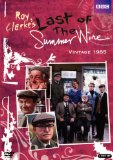| Reviews & Columns |
|
Reviews DVD TV on DVD Blu-ray 4K UHD International DVDs In Theaters Reviews by Studio Video Games Features Collector Series DVDs Easter Egg Database Interviews DVD Talk Radio Feature Articles Columns Anime Talk DVD Savant Horror DVDs The M.O.D. Squad Art House HD Talk Silent DVD
|
DVD Talk Forum |
|
|
| Resources |
|
DVD Price Search Customer Service #'s RCE Info Links |
|
Columns
|
|
|
Last of the Summer Wine: Vintage 1985
Perhaps not quite as funny as the previous Summer Wine collection I reviewed (maybe not as meaningful or as thoughtful, either)...but still worthwhile. The BBC and 2 | Entertain have released Last of the Summer Wine: Vintage 1985, a two-disc collection that includes not only the six episodes from that particular "series" ("season" in Brit-TV speak), but also the one-off 1983 and 1984 Christmas specials that substituted for season episodes those years. This is the last go-around for Foggy...until he comes back in 1990 for another seven-year stint on what was the longest-running sitcom in television history. No extras for this bare-bones presentation.
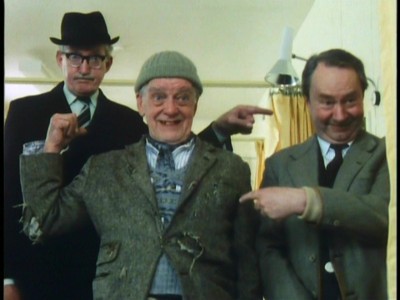
The basic premise of Last of the Summer Wine couldn't be simpler, nor more rich in comedic possibilities. Set in the small town of Holmfirth, West Yorkshire, three middle-aged-to-old men roam around town, discussing arcane subjects, contemplating the beauty of their surroundings, arguing with each other, and pulling childish pranks to keep themselves amused. And that's...it. Norman Clegg (Peter Sallis) is the philosopher of the bunch, a mild-mannered widower and redundant linoleum salesman who often goes off on obscure, frequently amusing reveries during his conversations, and who acts as a buffer between his two combative friends. "Foggy" Dewhurst (Brian Wilde) is the tall, imposing, yet utterly ineffectual former Army sign painter (retired) who never married, and who laments the loss of all things "British" as he sees the staid, orderly culture and society of his younger days irrevocably slipping away. And wildman Compo Simmonite (Bill Owen) is...well, he's Compo (British slang for "compensation"). Wearing his beloved Wellies, along with a disgusting, beat-up tweed jacket and a green wool cap (regardless of the weather), Compo often looks like's he's been living out in the woods--which matches his barnyard enthusiasm for sex, as well. In lust with married neighbor Nora Batty (Kathy Staff), who can't stand the sight of Compo, Compo also keeps an eye out for even the slightest suggestion of skin from Ivy (Jane Freeman), the large, shrewish wife of café owner Sid (John Comer). Oblivious to the niceties of society, Compo is the perfect thorn in the side of uptight, rigid, authoritarian Foggy. Both are prone to picking fights with each other (often at the sly instigation of jester Norman), while meek Norman snickers off to the side, enjoying the absurdities of life.
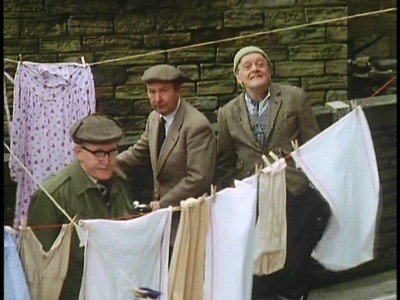
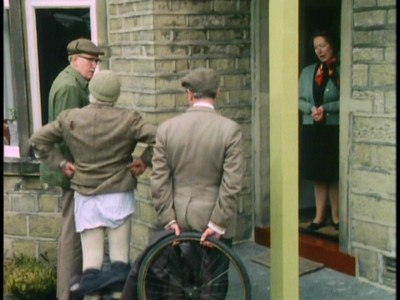
I haven't reviewed a Last of the Summer Wine DVD set since 2008, when I wrote about the 1977 season. We haven't seen any more releases of the series here at DVDTalk since then, so I was a little leery about checking out this 1985 "vintage" after losing so much ground. I needn't have worried. As I wrote in my first review, the uninitiated viewer can pretty much jump in wherever they might. The basic set-up of Last of the Summer Wine apparently didn't differ too terribly much over the 31 seasons (!) it was on the air--even with major cast changes--and at least by what I've seen of the series, nothing changed between the earlier 1977 season I reviewed and these 1983-1985 go-arounds. Of course, loyal fans of Last of the Summer Wine know that this past year, the BBC did finally succeed in deep-sixing the popular series after 37 years on the air, something they had wanted to do for a very long time (steady ratings are nice...but networks still cling to the outdated desire for younger demographics), so that distinct "timeless" feeling the series carried with it, both from within its repetitious framework and existential subtext, as well as from its pop culture context, is necessarily diminished now.
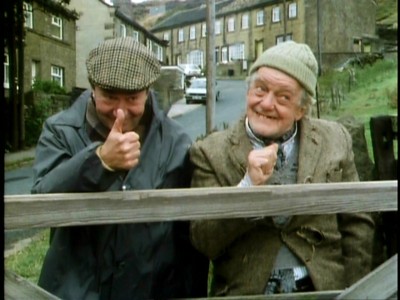
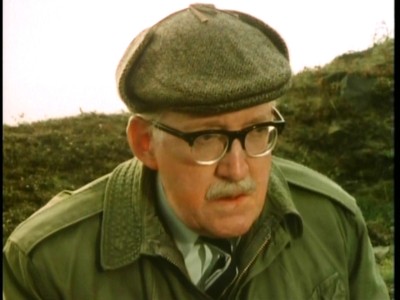
Looking back over my review for the 1977 season (and sneaking a peek at one of my favorite episodes on it), I raved about the gentle, magical tone of the series at that point in its timeline, an atmosphere that approximates an Ealing Studios' grasp of strange, quirky comic details coming out of solid characterizations, butted-up against broad slapstick and dirty-minded (yet subtle and "clean") double-entendres. Those elements are still present in these 1983-1985 efforts...but somehow, the deeper meaning of the piece--that sad, sad undertone of redundant men clinging to their friendship because they have nothing else in a world that has left them behind--seems muted now, perhaps even rote. 1983's Getting Sam Home, the first made-for-TV feature-length movie of the series, which filled in for the absence of any new episodes that year, is first up in this collection, and it starts off quite movingly (amid the generous laughs), as the boys' friend Sam leaves the hospital one last time, certain he's going to die. Locked tight in a loveless marriage to a horrible, uncaring wife, Sam wants only to spend one last night with his voluptuous mistress, Lily Bless Her (love that name)--an endeavor fraught with mortal risk to the sickly Ben, and one facilitated by the obliging boys ferrying the dangerously ill man to her bedroom. Up to this point in the story, Getting Sam Home is well-structured and written by the series' creator and only writer, Roy Clarke. The boys are sympathetic to their friend enjoying any kind of love he can find outside his hated marriage, and Sam's sad appraisal of his own situation is actually quite poignant (when you stop laughing at his hellish wife's awful put-downs). All well and good. But then the rest of the movie veers off into clunky, familiar farcical conventions of moving around the grinning dead body from shed to chip van to house to shed and back again, and while it's hard not to be amused by this, it goes on far too long, and even worse, it's never adequately connected up with the boys. We don't get a sense of how Sam's death effects them, or how their various philosophies deal with their own impending fate--themes that would have been made clear in the season I previously reviewed. The mechanics of the farce outshine the characterizations here.
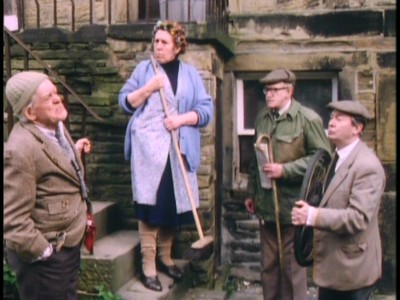
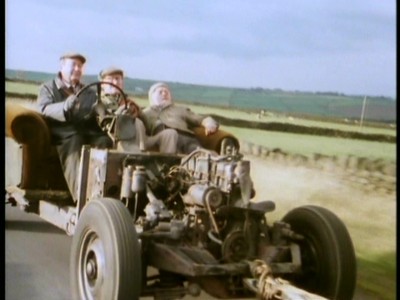
And the second Christmas special doesn't fare much better. The Loxley Lozenge, a brief 30-minute Christmas special broadcast in 1984 (again, as a substitute for a season of episodes that year), is certainly amusing, particularly when you get to the episode's laugh-out-loud final sight gag. However, it's difficult to find those subtle subtexts of sadness or longing or philosophical wonderings that always underpinned the laughs in previous seasons. The boys are asked to perform a secret mission: help tow a vintage "Loxley Lozenge" racing car for grimy mechanic Wesley. And that's pretty much all there is to the episode, minus an awkward section in the pub where a would-be pub brawler engages the boys in some meaningless fracas. Once the car-towing sequence comes, you expect some funny physical bits, and there is one priceless shot of the men, seated on a couch, sliding off the ruined chassis as it turns left and they shoot out to the right. But then...the episode comes to an abrupt end, and we wonder what that was all about.
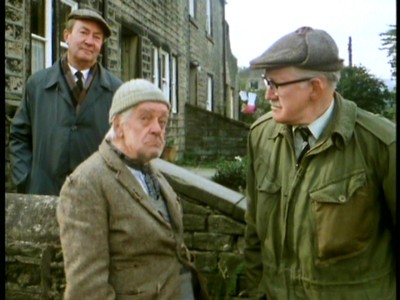
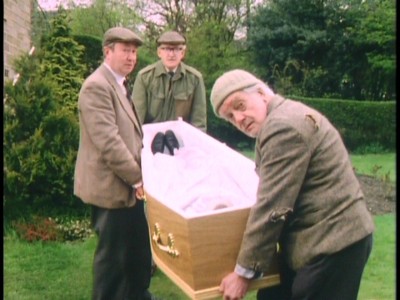
Once we get to a proper "series" of six episodes for the 1985 season (on disc two), there's no question that Roy Clarke is still more than capable of fashioning beautifully strange little stories that build on the thinnest of premises (Compo wants to know if Nora has big feet; the boys want to help lasso a donkey). However, the balance seems to fall smartly on the side of emphasizing humor this go-around, while the more philosophical musings of the characters have been toned down. And that's just fine; Clarke's jokes can be both deliciously subtle and more ribald through implied wordplay, and all filtered through a distinctive black British reserve. In The Mysterious Feet of Nora Batty, Nora's beleaguered husband Wally somehow gets around to the subject of men kissing each other, asserting agreeably that "Italians do it all the time, kissing each other at train stations," to which a startled Clegg replies, "I usually just buy a paper," which is then topped by fuzzy Wally gravely intoning, "You see some terrible things at wartime." In Keeping Britain Tidy, Foggy, overly-correct in his emergency aid procedures for a fallen bicyclist, demands slowly, "Can...you...understand...me?" to which the annoyed cyclist responds in kind, "You...great...dozy...Mary," a line-reading that killed me. And in Catching Digby's Donkey, Compo, ruminating on whether or not he and the boys should have helped a neighbor chase a renegade donkey, offers, "They [his beloved ferrets] get into places where a bloke has to be very careful before he starts asking for help," to which Foggy replies, "Yes, but a donkey's not likely to get there, is it?" topped by an alarmed Clegg who replies, "Heavens' forbid!"
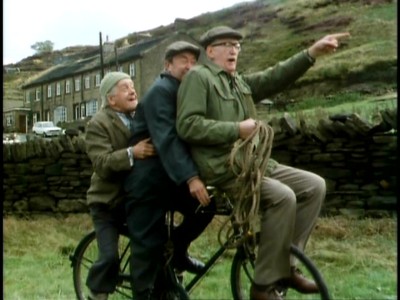
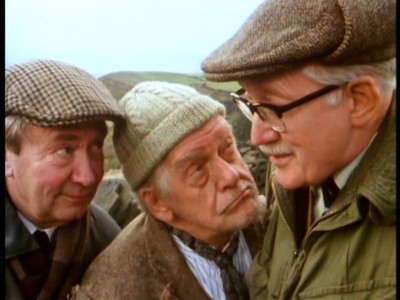
And the physical gags--a big one seems to wrap up each episode--are always amusing, too. The Mysterious Feet of Nora Batty probably has the most elaborate one, where the boys finally figure out a way to measure her feet: a stolen shoe store foot measure, placed on a large pole and extended underneath her feet as she hangs washing (the gag is topped when they fall a large distance into the canal...only to be seen standing, alive and well, in ankle-deep water). And the final episode has Compo comically riding around on the top of a Land Rover, taking time to ogle Nora as she undresses in her second-story bedroom window. I don't want to be dismissive of those jokes and moments of slapstick from Clarke and the talented cast. This is funny stuff, and it's beautifully structured and executed. But something seems to be missing at the center of the episodes, some essential yet ephemeral tone that had originally elevated the humor to a different level in previous seasons. Maybe it'll come back in the remaining 25 years of shows
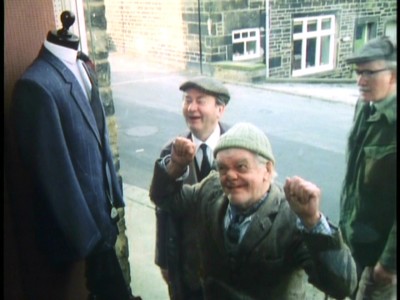
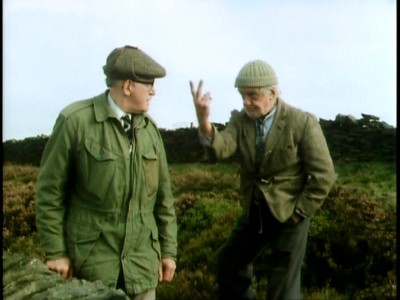
The DVD:
The Video:
Fairly typical for this kind of show, from this country. The 16mm elements (location shooting) are muddy and damaged for these full-screen, 1.33:1 transfers, while the video segments actually fare a little better, with brighter images and a bit more picture detail. Video noise is inevitable. If you've seen one British TV show from this time period, you won't be surprised by these transfers.
The Audio:
The English mono audio tracks do fluctuate (likely do to the original recording elements), but dialogue is clear enough (hiss is noticeable), and English subtitles will help anyone who's having trouble with those Northern dialects.
The Extras:
No extras, unfortunately, for Last of the Summer Wine: Vintage 1985.
Final Thoughts:
Not on the same level as previous Summer Wine seasons I've watched...but still funny. Philosophizing has been deemphasized while slapstick and double entendres have been amped up here in Last of the Summer Wine: Vintage 1985, and that's okay, because writer/creator Roy Clarke can still take this simple premise and ring comedy gold out of his quirky characters. However...something seems...missing here, something from the heart. I'm recommending Last of the Summer Wine: Vintage 1985 for lovers of vintage British TV sitcoms.
Paul Mavis is an internationally published film and television historian, a member of the Online Film Critics Society, and the author of The Espionage Filmography.


|
| Popular Reviews |
| Sponsored Links |
|
|
| Sponsored Links |
|
|
| Release List | Reviews | Shop | Newsletter | Forum | DVD Giveaways | Blu-Ray | Advertise |
|
Copyright 2024 DVDTalk.com All Rights Reserved. Legal Info, Privacy Policy, Terms of Use,
Manage Preferences,
Your Privacy Choices | |||||||









